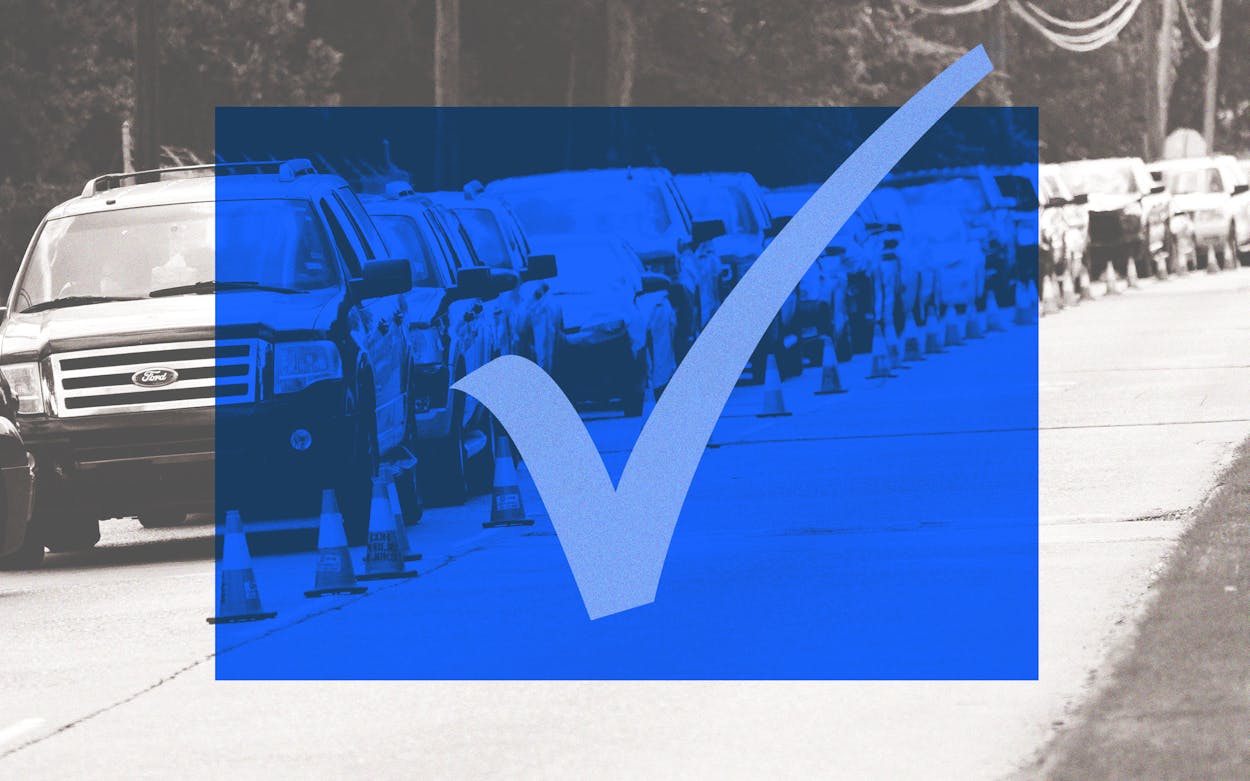During the pandemic, the word “curbside” has gotten a serious workout. Groceries, pizza, home improvement materials, books, clothes—basically anything you used to go inside a building to get can now be come by without leaving your car. While some of these goods and services are innovations of the COVID-19 era, one drive-up service has long been built into Texas election law: voters can request to cast their ballot curbside at any polling location in the state.
Texas Election Code says that “if a voter is physically unable to enter the polling place without personal assistance or likelihood of injuring the voter’s health, on the voter’s request, an election officer shall deliver a ballot to the voter at the polling place entrance or curb.” Keith Ingram, Texas’s director of elections, told KXAN that “if a voter feels like they are symptomatic or may have been exposed to a person with COVID-19, we encourage them to utilize curbside voting.” Travis County clerk Dana DeBeauvoir told KUT that the measure is intended for those “who literally cannot get out of the car and walk inside the polling place” and is not “intended for mass usage.” (Voters who call the Travis County elections hotline to request a curbside ballot, however, are not asked to describe their disability to determine if they qualify.) In Harris County, meanwhile, polling centers have installed handy buzzers for curbside ballots, encouraging voters who “need to stay away from others” for reasons including (but not limited to) COVID symptoms or exposure to pull up and cast their vote from within their car.
When we asked the Texas Secretary of State’s office, which oversees elections, whether the “likelihood of injuring the voter’s health” clause applies to people who don’t think they have the coronavirus but are worried about contracting it, a representative from the office responded by quoting the election code, without further explanation. If all of this feels a bit confusing, well, it is. The election code seems to say that curbside ballots are available to voters who determine their own health is likely to be at risk, while the advice from officials, like Ingram, focuses more on the consideration of spreading the disease to others.
The confusion is not new: Texas’s rules around voting during the pandemic have been perplexing since the state challenged in courts the expansion of mail-in ballots to all who fear contracting the coronavirus. The Texas Supreme Court ruled that fear alone doesn’t qualify one to vote by mail, however it determined that “a voter can take into consideration aspects of his health and his health history that are physical conditions in deciding whether, under the circumstances, to apply to vote by mail because of disability.” That guidance has bewildered voters, and while a case seeking to clarify the issue wasn’t ruled on by the U.S. Supreme Court before the primary runoff vote-by-mail deadline, such a ruling might come before November.
When it comes to curbside voting, voters seem to be in the unique position of determining for themselves what they are confident the best application of Texas election law is. That’s not an ideal situation to be in as voters continue to weigh their own health, the spread of COVID-19 around Texas, the fact that polling places are exempt from statewide orders requiring mask-wearing in public, and the needs of voters with disabilities to have access to systems that weren’t built to implement wide-scale drive-through voting. But it is the situation we find ourselves in, and statewide officials and some locals recommend that anyone with COVID-19 symptoms—which includes anyone with a cough—interpret the current election law to include themselves in the group that qualifies to cast a curbside ballot. For those who are concerned about becoming symptomatic in the future—a group that should include anyone with lungs—the guidance is less clear. Texas law, for now, seems to require polling places to bring a ballot to your car if you call and ask for one. Good luck.
- More About:
- Politics & Policy








